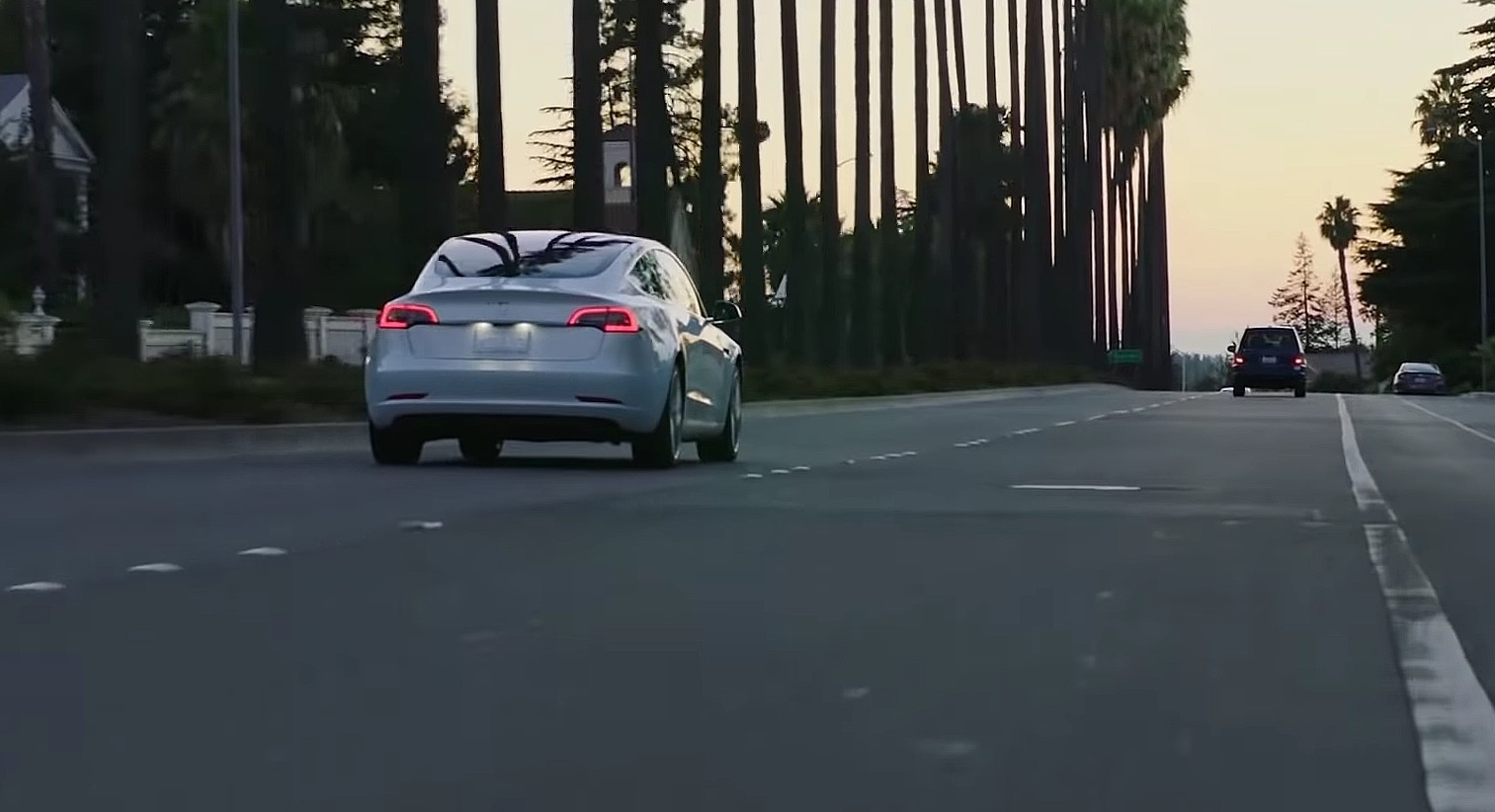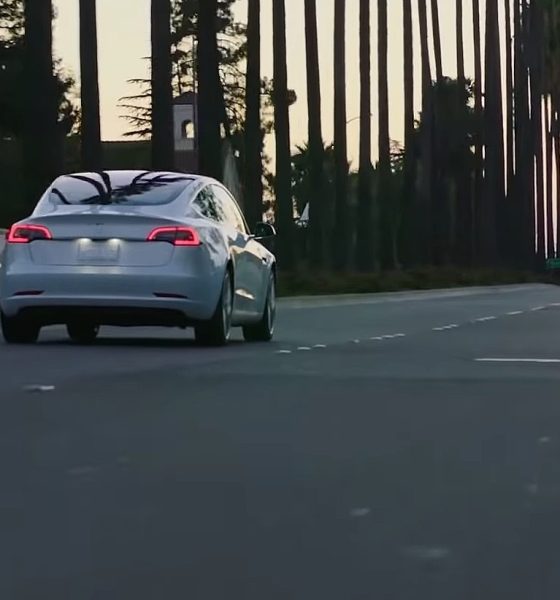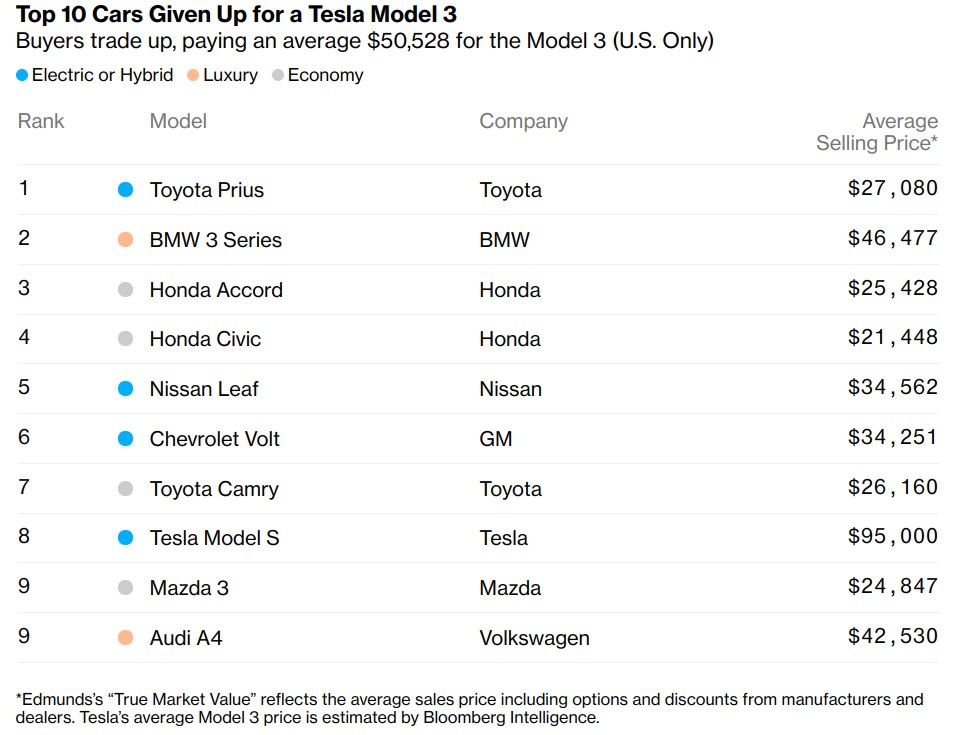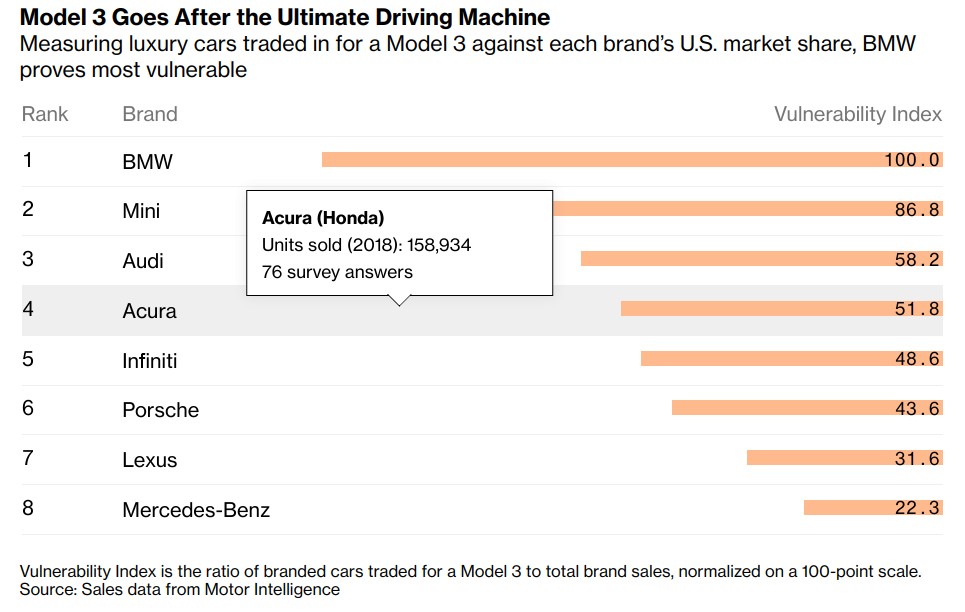

Investor's Corner
The Tesla Model 3 is replacing BMW as the US’ ‘Ultimate Driving Machine’
German-made automobiles have established their reputation for their excellence in selected segments. While Mercedes-Benz prides itself on building its vehicles for comfort and class, BMW prides itself on its cars’ driving performance. This is the reason behind BMW and its “Ultimate Driving Machine” moniker. Yet, in the electric age, there seems to be a single car that is steadily hacking into BMW since it was unveiled — the Tesla Model 3.
Bloomberg recently released the fourth part of its Model 3 survey, which aggregated data from 5,000 Tesla owners about their experiences and insights about the all-electric sedan. This time around, the publication focused on the Model 3’s effect on the market. And based on the results of its study, it appears that the Model 3 is now taking away customers from legacy automakers, including those who previously only had more affordable vehicles, as well as those that prioritize performance above all else.

Data gathered by the publication showed that the BMW 3 Series was among the most popular cars that were traded in by owners who bought a Model 3. The BMW 3 Series joins other, more affordable vehicles like the Toyota Prius, the Honda Accord, and the Toyota Camry, as some of the top vehicles that have been traded-in for the all-electric vehicle. This means that customers are making a stretch to acquire the Model 3, and BMW 3 Series owners are likely coming over to Tesla due to driving performance.
This was mentioned by some respondents in Bloomberg‘s study. “I’ve owned three BMW 3 Series and was a diehard BMW fan. The Tesla blows those cars away,” one respondent noted.
It could be said that BMW is the veteran carmaker that is most vulnerable to the assault of the Tesla Model 3. Other carmakers whose vehicles are being traded-in frequently for Tesla’s midsize sedan such as Toyota have an extremely large presence in the United States. Thus, even if the Prius and the Corolla and the Camry take hits due to the Model 3, the company still has a healthy market share in America. This is not the case with BMW.

With this in mind, BMW stands to lose far more than automakers like Toyota due to the Model 3’s advance. Couple this with benchmarking tests against the Model 3 such as those conducted by BBC‘s Top Gear, which concluded that “Electric Beats Petrol! Tesla Model 3 Outguns BMW M3” after the EV beat the petrol-powered car by 2 seconds at the Thunderhill Raceway Park in California, and the German automaker might very well find itself on dire straits soon. This was reflected in Bloomberg‘s study, which listed BMW as the most vulnerable brand against Tesla.
There are many things about the Model 3 that its owners love, but one former BMW X5 owner provided some deeper insight to the publication. According to the former BMW owner, Tesla’s consistent software updates make her vehicle feel brand new all the time, and it is simply something that is not matched by any other carmaker today.
“One of the things I absolutely adore about the Model 3 is that I feel like I get a new car about every 12 weeks. I have so many features now that I didn’t have when I bought the car a year ago. Normally, at about a year, year-and-a-half of ownership I’m already scouting out the freeways for what looks good, and I find that I don’t do that with the Model 3,” the Model 3 owner said.
The fourth part of Bloomberg‘s Model 3 survey could be accessed here.

Elon Musk
Tesla stock gets latest synopsis from Jim Cramer: ‘It’s actually a robotics company’
“Turns out it’s actually a robotics and Cybercab company, and I want to buy, buy, buy. Yes, Tesla’s the paper that turned into scissors in one session,” Cramer said.

Tesla stock (NASDAQ: TSLA) got its latest synopsis from Wall Street analyst Jim Cramer, who finally realized something that many fans of the company have known all along: it’s not a car company. Instead, it’s a robotics company.
In a recent note that was released after Tesla reported Earnings in late January, Cramer seemed to recognize that the underwhelming financials and overall performance of the automotive division were not representative of the current state of affairs.
Instead, we’re seeing a company transition itself away from its early identity, essentially evolving like a caterpillar into a butterfly.
The narrative of the Earnings Call was simple: We’re not a car company, at least not from a birds-eye view. We’re an AI and Robotics company, and we are transitioning to this quicker than most people realize.
Tesla stock gets another analysis from Jim Cramer, and investors will like it
Tesla’s Q4 Earnings Call featured plenty of analysis from CEO Elon Musk and others, and some of the more minor details of the call were even indicative of a company that is moving toward AI instead of its cars. For example, the Model S and Model X will be no more after Q2, as Musk said that they serve relatively no purpose for the future.
Instead, Tesla is shifting its focus to the vehicles catered for autonomy and its Robotaxi and self-driving efforts.
Cramer recognizes this:
“…we got results from Tesla, which actually beat numbers, but nobody cares about the numbers here, as electric vehicles are the past. And according to CEO Elon Musk, the future of this company comes down to Cybercabs and humanoid robots. Stock fell more than 3% the next day. That may be because their capital expenditures budget was higher than expected, or maybe people wanted more details from the new businesses. At this point, I think Musk acolytes might be more excited about SpaceX, which is planning to come public later this year.”
He continued, highlighting the company’s true transition away from vehicles to its Cybercab, Optimus, and AI ambitions:
“I know it’s hard to believe how quickly this market can change its attitude. Last night, I heard a disastrous car company speak. Turns out it’s actually a robotics and Cybercab company, and I want to buy, buy, buy. Yes, Tesla’s the paper that turned into scissors in one session. I didn’t like it as a car company. Boy, I love it as a Cybercab and humanoid robot juggernaut. Call me a buyer and give me five robots while I’m at it.”
Cramer’s narrative seems to fit that of the most bullish Tesla investors. Anyone who is labeled a “permabull” has been echoing a similar sentiment over the past several years: Tesla is not a car company any longer.
Instead, the true focus is on the future and the potential that AI and Robotics bring to the company. It is truly difficult to put Tesla shares in the same group as companies like Ford, General Motors, and others.
Tesla shares are down less than half a percent at the time of publishing, trading at $423.69.
Elon Musk
Tesla to a $100T market cap? Elon Musk’s response may shock you

There are a lot of Tesla bulls out there who have astronomical expectations for the company, especially as its arm of reach has gone well past automotive and energy and entered artificial intelligence and robotics.
However, some of the most bullish Tesla investors believe the company could become worth $100 trillion, and CEO Elon Musk does not believe that number is completely out of the question, even if it sounds almost ridiculous.
To put that number into perspective, the top ten most valuable companies in the world — NVIDIA, Apple, Alphabet, Microsoft, Amazon, TSMC, Meta, Saudi Aramco, Broadcom, and Tesla — are worth roughly $26 trillion.
Will Tesla join the fold? Predicting a triple merger with SpaceX and xAI
Cathie Wood of ARK Invest believes the number is reasonable considering Tesla’s long-reaching industry ambitions:
“…in the world of AI, what do you have to have to win? You have to have proprietary data, and think about all the proprietary data he has, different kinds of proprietary data. Tesla, the language of the road; Neuralink, multiomics data; nobody else has that data. X, nobody else has that data either. I could see $100 trillion. I think it’s going to happen because of convergence. I think Tesla is the leading candidate [for $100 trillion] for the reason I just said.”
Musk said late last year that all of his companies seem to be “heading toward convergence,” and it’s started to come to fruition. Tesla invested in xAI, as revealed in its Q4 Earnings Shareholder Deck, and SpaceX recently acquired xAI, marking the first step in the potential for a massive umbrella of companies under Musk’s watch.
SpaceX officially acquires xAI, merging rockets with AI expertise
Now that it is happening, it seems Musk is even more enthusiastic about a massive valuation that would swell to nearly four-times the value of the top ten most valuable companies in the world currently, as he said on X, the idea of a $100 trillion valuation is “not impossible.”
It’s not impossible
— Elon Musk (@elonmusk) February 6, 2026
Tesla is not just a car company. With its many projects, including the launch of Robotaxi, the progress of the Optimus robot, and its AI ambitions, it has the potential to continue gaining value at an accelerating rate.
Musk’s comments show his confidence in Tesla’s numerous projects, especially as some begin to mature and some head toward their initial stages.
Elon Musk
Tesla director pay lawsuit sees lawyer fees slashed by $100 million
The ruling leaves the case’s underlying settlement intact while significantly reducing what the plaintiffs’ attorneys will receive.

The Delaware Supreme Court has cut more than $100 million from a legal fee award tied to a shareholder lawsuit challenging compensation paid to Tesla directors between 2017 and 2020.
The ruling leaves the case’s underlying settlement intact while significantly reducing what the plaintiffs’ attorneys will receive.
Delaware Supreme Court trims legal fees
As noted in a Bloomberg Law report, the case targeted pay granted to Tesla directors, including CEO Elon Musk, Oracle founder Larry Ellison, Kimbal Musk, and Rupert Murdoch. The Delaware Chancery Court had awarded $176 million to the plaintiffs. Tesla’s board must also return stock options and forego years worth of pay.
As per Chief Justice Collins J. Seitz Jr. in an opinion for the Delaware Supreme Court’s full five-member panel, however, the decision of the Delaware Chancery Court to award $176 million to a pension fund’s law firm “erred by including in its financial benefit analysis the intrinsic value” of options being returned by Tesla’s board.
The justices then reduced the fee award from $176 million to $70.9 million. “As we measure it, $71 million reflects a reasonable fee for counsel’s efforts and does not result in a windfall,” Chief Justice Seitz wrote.
Other settlement terms still intact
The Supreme Court upheld the settlement itself, which requires Tesla’s board to return stock and options valued at up to $735 million and to forgo three years of additional compensation worth about $184 million.
Tesla argued during oral arguments that a fee award closer to $70 million would be appropriate. Interestingly enough, back in October, Justice Karen L. Valihura noted that the $176 award was $60 million more than the Delaware judiciary’s budget from the previous year. This was quite interesting as the case was “settled midstream.”
The lawsuit was brought by a pension fund on behalf of Tesla shareholders and focused exclusively on director pay during the 2017–2020 period. The case is separate from other high-profile compensation disputes involving Elon Musk.








